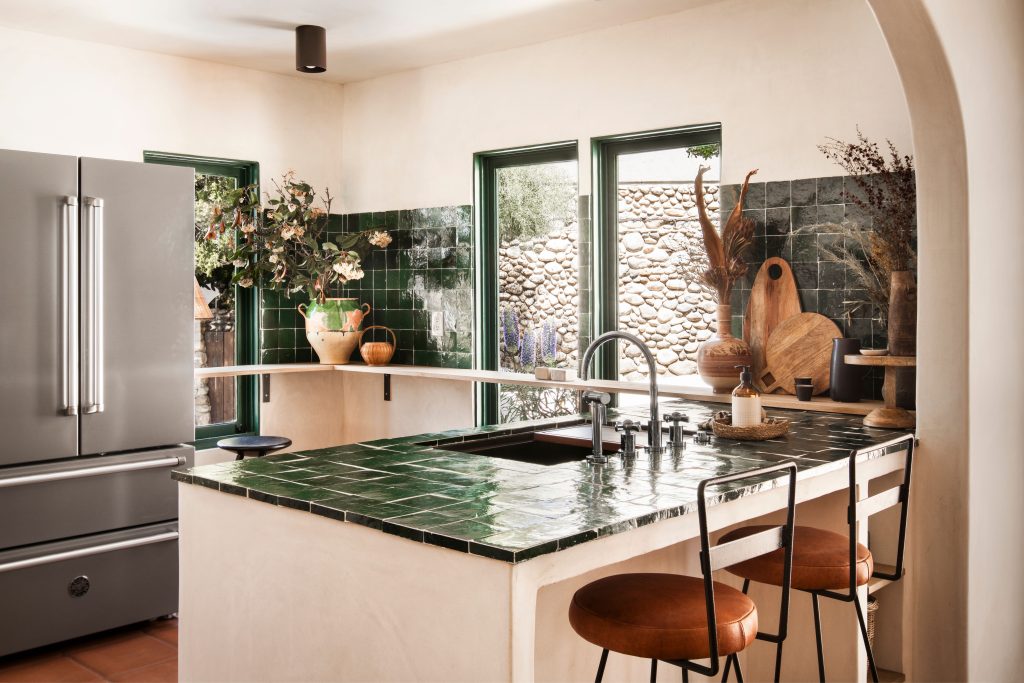:max_bytes(150000):strip_icc():format(jpeg)/bhg-white-kitchen-with-green-tile-CzOnKxyTald97FPxiCDnX_-4ada5e52cd1348ad9ba875a0575af9e5.jpg)
Zellige tiles are everywhere right now. The term zellige (rhymes with “prestige”) refers to tiles that are cut, shaped and glazed by hand, meaning that no two are exactly the same. The subtle yet striking imperfections of zellige tiles create a sort of rippled effect, bringing warmth and authenticity into any space they’re added to.
Rooted in Moroccan tradition, zellige tiles are a rich part of Islamic craftsmanship. However, their bright colors, high-shine finishes, and major style impact helps them fit seamlessly into modern, rustic, or minimalist spaces alike. Discover how Morocco’s 1,000-year-old zellige tile craft evolved into today’s most Instagrammable design trend, blending history with modern style.
Why Zellige Tile Is So Popular Right Now
1. It’s Modern Yet Timeless
They might seem new to the scene in the US, but this same mosaic tilework was actually developed in Islamic North Africa around the 10th–11th century, becoming especially refined in Fez by the 14th century. Centuries later, interior trend roundups consistently name zellige as a top tile trend. On top of that, they’re dominating the scene on social media, in designer portfolios, and magazines—and the reason why is simple. Zellige tile works anywhere.
Its organic feel brings an earthy touch to modern spaces, while its centuries-old timelessness works well in traditional spaces too. The handmade nature creates a completely unique effect that simply can’t be replicated twice. Zellige tile is also a hit for eco-conscious homes as it’s made from natural clay and by hand, versus mass-produced tiles that are made by machines.
Ibrahim Özbunar
2. Zellige Is Incredibly Versatile
Not only are zellige tiles strikingly beautiful to look at, they’re incredibly versatile. They’re available in nearly every color, from subtle neutrals to vivid red, oranges, yellows, pinks, blues—you name it. They can also be laid in a huge variety of patterns, whether they be set in simple stacked rows, staggered like subway tile, or set in patterns like herringbone, checkerboard, or complex mosaics.
Plus, they can be used just about anywhere in the home. Use it to decorate bathroom and shower walls, fireplace surrounds, or niches, shelving recesses, or alcoves as a jewel-like accent.
If you’re deciding between glazed and unglazed zellige, consider whether you want a bold or subtle look. A glossed zellige works to reflect light, lending a more glamorous quality that accentuates the handcrafted quality of the tiles.
Adam Potts
3. They Add Dynamic Visual Interest
Think of the way the light reflects off the top of a rippled lake. Traditional zellige tiles have a high-gloss sheen, each tile catching natural sunlight, candlelight, or even lamp light in unexpected ways. The glossy glaze on their characteristically uneven surface creates helps the tile feel dynamic rather than static, creating an incredible amount of visual movement and depth. On top of that, because each tile is hand-glazed, the color application will also be slightly uneven, with each individual tile featuring a range of hues.
Kim Cornelison
4. They’re Surprisingly Durable (and Easy to Clean!)
Because of its high-end appearance, zellige tile looks delicate—but it’s incredibly durable. Thanks to their heat resistance, they’re often used as kitchen backsplashes, but they work well in almost every area of the home. Another draw? Zellige tile is incredibly easy to clean, making it ideal for use in places like kitchens and bathrooms, as it doesn’t show soap scum like other tiles might.

